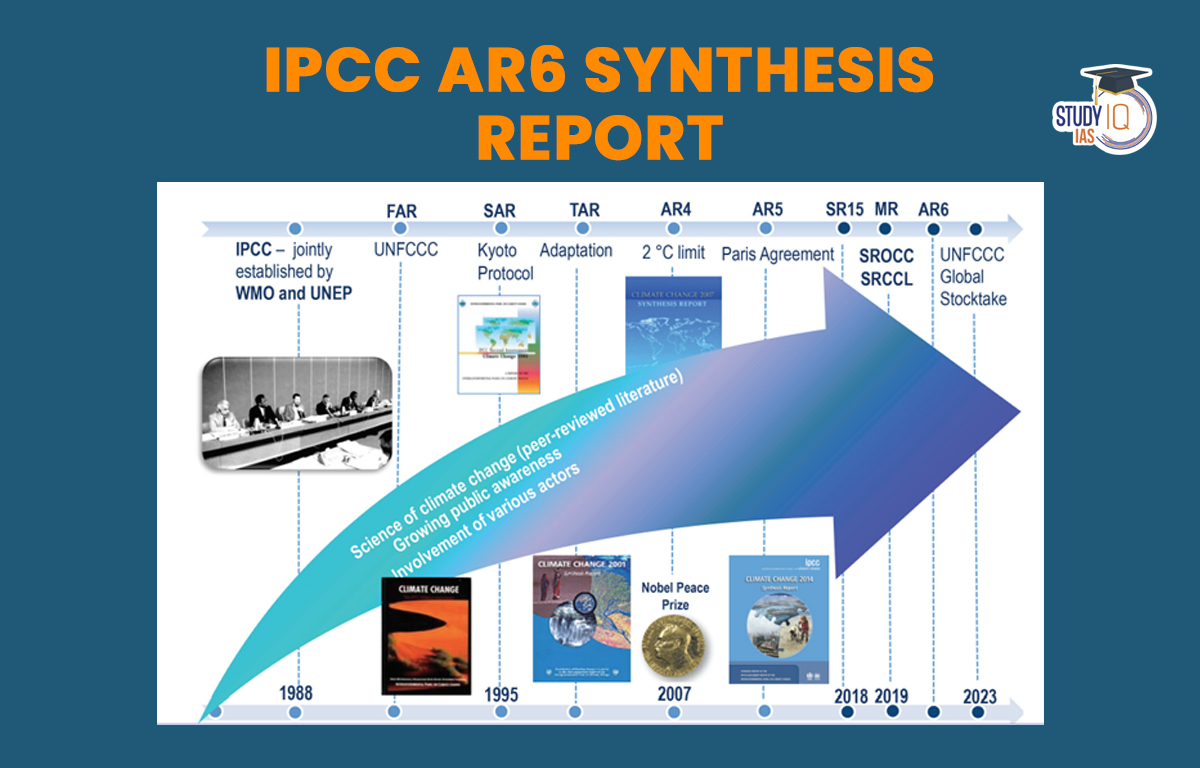Table of Contents
Context: The IPCC finalized the Synthesis Report for the Sixth Assessment Report (AR6) during the Panel’s 58th Session held in Interlaken, Switzerland recently.
What is IPCC’s IPCC AR6 Synthesis Report?
- The Synthesis Report is a compilation of the main findings of the IPCC’s Sixth Assessment Report, based on results from three Working Groups (WGs).
- These working groups are: WG I which evaluated the physical science basis of climate change, WG II evaluated the impacts, adaptation, and vulnerability, and WG III which evaluated the mitigation.
- The Synthesis Report also drew from Special Reports based on Global Warming of 1.5°C (October 2018), Climate Change and Land (August 2019), and the Ocean and Cryosphere in a Changing Climate (September 2019).
What is IPCC (Intergovernmental Panel on Climate Change)?
- The IPCC is the UN body for assessing the science related to climate change.
- It was jointly set up in 1988 by the World Meteorological Organization and United Nations Environment Programme (UNEP).
- The IPCC produces comprehensive assessment reports on the state of knowledge about climate change, based on the input of thousands of scientists and experts from around the world.
- It has produced six Assessment Reports (AR) so far, with the latest one being AR6, which was released in 2021.
Key takeaways from the IPCC AR6 Synthesis Report
- Global warming: Since the industrial age, largely due to human activities, the Earth’s average temperature has already risen by 1.1 degrees Celsius.
- By 2030 there is a 50% chance that global surface temperature in any single year could exceed 1.5°C.
- To keep within the 1.5°C limit, emissions need to be reduced by at least 43% by 2030 compared to 2019 levels, and at least 60% by 2035.
- Impacts of global warming: Due to the current global warming levels, almost every region across the planet is already experiencing climate extremes, an uptick in deaths due to heatwaves, reduced food and water security and damage to ecosystems etc.
- Overshooting 1.5°C will result in irreversible adverse impacts on certain ecosystems with low resilience, such as polar, mountain, coastal ecosystems, etc.
- Carbon dioxide (CO2) emissions: CO2 is the primary GHG and needs to be drastically reduced.
- The report mentions that for every 1000 GtCO2 emitted by human activity, global surface temperature rises by 0.45°C.
- Adaptation measures: Climate policies in at least 170 countries now consider adaptation, but in many nations, these efforts have yet to progress from planning to implementation.
- The current financial flows for adaptation at the global level are inadequate and limit the implementation of adaptation measures, particularly in developing nations.
- Climate change adaptation refers to the actions and measures taken to cope with and minimize the negative impacts of climate change.
- Maladaptation: India has many such examples of maladaptation, resulting in vulnerable communities becoming more helpless to the impacts of climate change rather than being able to adapt to them.
- Maladaptation refers to actions or measures taken to adapt to the impacts of climate change that have unintended negative consequences, such as exacerbating existing vulnerabilities.

Implications for India
- With a large vulnerable population, India needs to prioritize grants and policies that focuses on adapting to the effects of climate change.
- India’s priority should be to minimise loss and damage in terms of lives, livelihood and biodiversity, and accelerate equitable action mitigation and adaptation.
- As a developing country, India can lower its per-capita emissions through energy efficiency policies already being implemented in almost every sector, however, it can also decarbonize the energy sector by using cleaner options like solar and renewable energy.
Way Ahead
- The report suggests climate resilient development that will not only mitigate the effects of climate change but also provide wider benefits.
- Access to clean energy, improving air quality to increase employment opportunities, boosting healthcare through technology, and delivering equity are among the report’s recommended goals to help adapt to climate change.
- The report also foregrounded the role of financial investments to achieve climate goals and encouraged public funding through central banks, government and financial regulators to reduce emissions, scale up climate resilience, and protect low-income and marginalized communities.


 100 Years of CPI: Origins, Ideology, Fre...
100 Years of CPI: Origins, Ideology, Fre...
 Santhali Language: History, Script, Cons...
Santhali Language: History, Script, Cons...
 How African Reserves Eliminated Rhino Po...
How African Reserves Eliminated Rhino Po...

























